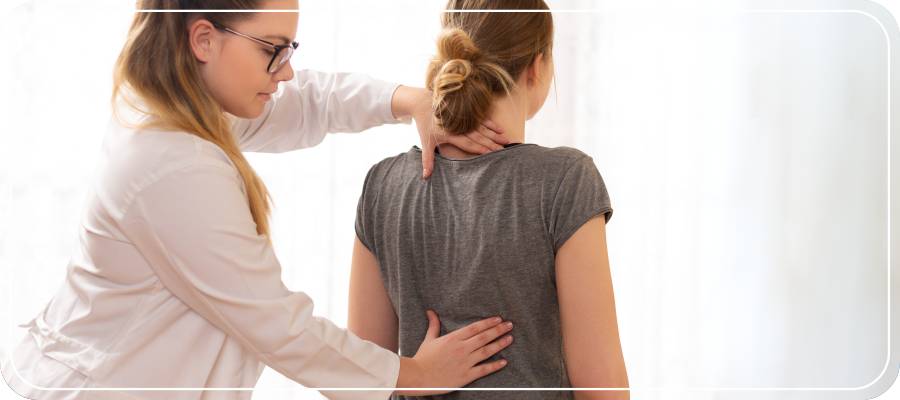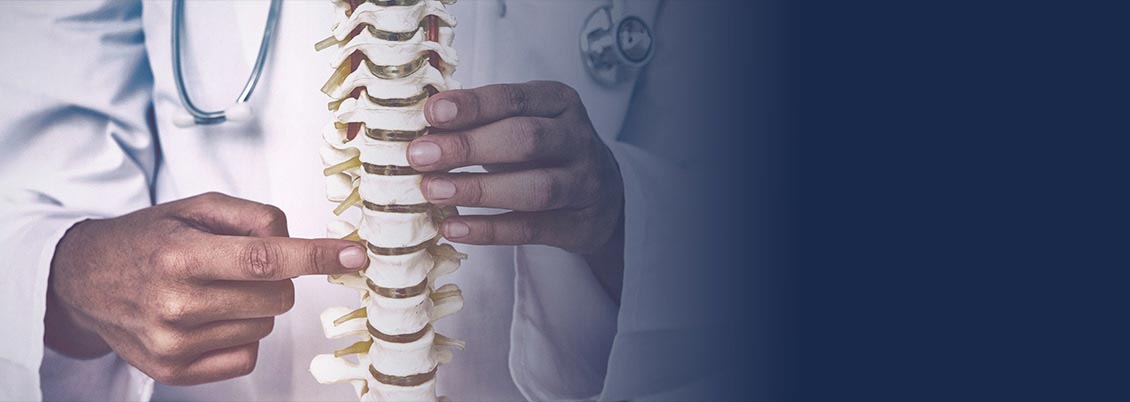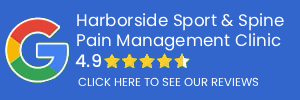Slipped Disc Treatment Specialist in Jersey City, NJ
A slipped disc occurs when a disc fragment pushes out of the annulus into the spinal canal through a tear or rupture, often due to age or certain motions. Symptoms include pain and numbness, worsening after standing or sitting, muscle weakness, and sensations like tingling, aching, or burning in the affected area. Slipped discs can cause severe back and neck pain, reducing your overall quality of life. Our board-certified Dr. David Sylvester, DC, at Harborside Sport & Spine, offers effective treatment options. For more information, contact us or book an appointment online. We serve patients from Jersey City, NJ, and surrounding areas.




Table of Contents:
What causes a slipped disc?
Can a slipped disc heal on its own?
Are slipped discs very serious?
How do you fix a slipped disc?
How can Dr. David Sylvester, DC at Harborside Sport & Spine help you recover from a slipped disc?
At Harborside Sport & Spine Jersey City, NJ, our team is dedicated to providing specialized care for those suffering from slipped disc issues. Our expert slipped disc treatment specialists utilizes a comprehensive approach that combines state-of-the-art technology with personalized rehabilitation plans. Whether you’re experiencing chronic back pain, reduced mobility, or other related symptoms, our goal is to not only alleviate your immediate discomfort but also to address the root cause of your condition. Nestled in the heart of Jersey City, NJ, we’re committed to helping our patients reclaim their quality of life through effective, targeted treatments designed around each individual’s unique health needs.
A slipped disc, medically known as a herniated disc, occurs when the soft gel-like center of a spinal disc pushes through a tear in the tougher exterior casing. This condition is often the result of gradual, age-related wear and tear, referred to as disc degeneration. As people age, their spinal discs lose some of their water content, making them less flexible and more prone to tearing or rupturing with even a minor strain or twist. Factors that may increase the risk of a herniated disc include genetics, certain physically demanding jobs, obesity, which puts extra stress on the discs of the lower back, and lifestyle choices such as smoking that can degrade disc health. Activities that involve repetitive lifting, pulling, pushing, bending sideways, and twisting can also put undue stress on the spine and potentially lead to disc herniation.
In many cases, a slipped disc can indeed heal on its own, given adequate time and the right approach to care. The human body possesses a remarkable capacity for self-healing, and with a herniated disc, this process is no different. Rest, combined with specific lifestyle adjustments and physical therapy, can significantly aid in recovery. The natural healing process can be facilitated by avoiding activities that exacerbate the condition, such as heavy lifting or sudden movements that strain the back. Furthermore, engaging in exercises that strengthen the back and core muscles, under the guidance of a healthcare professional, can help support the spine and reduce the likelihood of further injury. While the duration of healing can vary widely from person to person, many individuals see improvement within a few weeks to a few months. However, it is crucial to consult with a healthcare provider to create an appropriate treatment plan tailored to the severity of the condition and the individual’s overall health.
A slipped disc, while not always debilitating, can vary significantly in seriousness depending on the severity and location of the herniation as well as its effect on nearby nerve roots. For some individuals, this condition may cause minimal symptoms, whereas for others, it can lead to severe pain, numbness, or weakness in an arm or leg, and in extreme cases, it may result in complications such as cauda equina syndrome, a rare but serious condition that requires immediate medical intervention. The seriousness of a slipped disc is also underscored by its potential impact on daily activities and quality of life. People suffering from this condition might find it challenging to perform basic tasks, engage in work, or participate in their favorite activities without experiencing discomfort or pain. Thus, while many cases of a slipped disc can improve with non-surgical treatments and time, the condition should be taken seriously, with individuals seeking medical advice to manage symptoms and prevent further spinal damage.
Treatment for a slipped disc varies depending on the severity of the condition and the specific symptoms experienced by the individual. Initially, conservative treatments such as physical therapy, medication to relieve pain and reduce inflammation, and lifestyle modifications are recommended. Physical therapy exercises aim to improve flexibility, strengthen the muscles supporting the back, and reduce nerve pressure. Medications may include over-the-counter pain relievers, muscle relaxants, or even nerve pain medications. Lifestyle changes, particularly weight management and quitting smoking, can also play a crucial role in alleviating symptoms and preventing further disc damage. For individuals who do not respond to these measures, epidural steroid injections or surgery may be considered. Surgical options are typically reserved for cases where conservative treatments have failed and the profound nerve compression leads to significant weakness, loss of bowel or bladder control, or when the pain becomes debilitating and severely affects the quality of life.
At Harborside Sport & Spine, we understand the challenges that come with dealing with a slipped disc, and we are here to support you every step of the way towards recovery. Our dedicated team of specialists is committed to providing effective, personalized care to help you return to your daily activities without pain. If you’re experiencing symptoms of a slipped disc or have concerns about your spinal health, don’t hesitate to reach out to us.
A slipped disc, also known as a herniated or bulging disc, can cause sharp pain, numbness, tingling, or weakness—especially in the back, neck, or limbs. At Harborside Sport & Spine in Jersey City, Dr. David Sylvester, DC, offers non-surgical, personalized treatment plans to relieve pressure on the affected disc and restore spinal function.
Dr. Sylvester uses a combination of chiropractic adjustments, spinal decompression therapy, soft tissue techniques, and corrective exercises to reduce inflammation and promote healing. Each plan is customized to your condition, lifestyle, and goals, with a focus on long-term relief and preventing recurrence. At Harborside Sport & Spine, patients benefit from a whole-body approach to care that goes beyond symptom relief.
Contact us or book an appointment online today to start your journey to recovery and reclaim your quality of life. We look forward to assisting you in achieving optimal spinal health. We serve patients from Jersey City NJ, Hoboken NJ, Weehawken NJ, West New York NJ, Guttenberg NJ, Secaucus NJ, Harrison NJ, Kearny NJ, Newark NJ, Belleville NJ, Lyndhurst NJ, East Orange NJ, and Elizabeth NJ.
Check Out Our 5 Star Reviews


Chiropractic and Physical Therapy Services
▸ Chiropractic
▸ Physical Therapy
▸ Massage Therapy
▸ Acupuncture
▸ Spinal Decompression
▸ Prenatal Chiropractor
▸ Ear Infections
▸ Foot Pain
▸ Headaches
▸ Scoliosis
▸ Slipped Disc
▸ Sprained Ankles
▸ Stress
▸ Frozen Shoulder
▸ Osteoporosis
▸ Shoulder Pain







